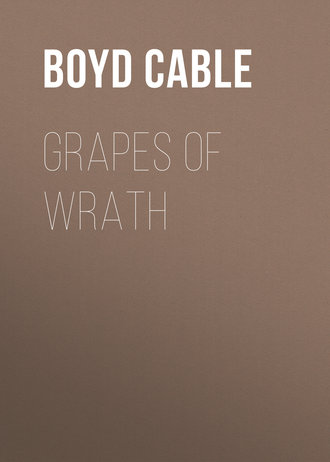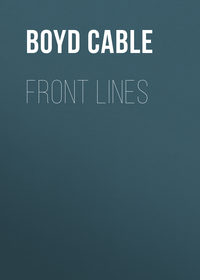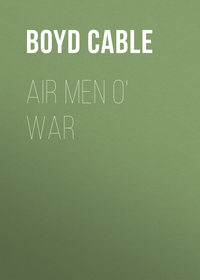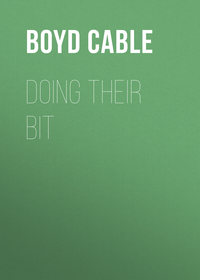
Grapes of wrath
“Right, sir,” said Kentucky; “I’ll get it through.” He nodded to Pug, “S’long, Pug,” and Pug nodded back, “So long, Kentuck. Goo’ luck.” Kentucky scrambled from the hole and went off, crouching and dodging and running. No other man was showing above ground, and as he ran he felt most horribly lonely and appallingly exposed. He took what cover he could, but had to show himself above ground most of the time, because he gained little in safety and lost much in time by jumping in and out of the shell holes. So he skirted the larger ones and ran on, and came presently to the line of Anzacs waiting to support. He hardly waited to answer the eager questions they threw him, but hurried on, crossed the ruined fragments of the old trench, found presently a twisted shallow gully that appeared to run in the direction he wanted, ducked into it, and pushed on till he came almost abreast of the gray wall. He had to cross the open again to come to it, and now, with a hazy idea that it would be a pity to fail now, took infinite precautions to crawl and squirm from hole to hole, and keep every scrap of cover he could. He reached the wall at last and crept round it, exulting in his success. He looked round for the officer – and saw no one. A shock of amazement, of dismay, struck him like a blow. He had struggled on with the one fixed idea so firmly in his mind, looking on the gray wall so definitely as his goal, measuring the distance to it, counting the chances of reaching it, thinking no further than it and the delivery of his message there, that for a moment he felt as lost, as helpless as if the sun had vanished at noon. He was just recovering enough to be beginning to curse his luck and wonder where he was to look for the lost officer when a loud voice made him jump. “Section fire ten seconds,” it said, and a moment later a hollow and muffled voice repeated tonelessly: “Section fire ten seconds.” Kentucky looked round him. A dead man sprawled over the edge of a shell hole, a boot and leg protruded from behind some broken rubble, but no living man was in sight, although the voices had sounded almost elbow close.
“Hullo,” said Kentucky loudly. “Artillery. Where are you, sir?”
“Hullo,” answered the voice. “Who is there?” and from a tumbled pile of sandbags at the end of the broken wall a head was cautiously raised. “Do you want me? Keep down out of sight. I don’t want this place spotted.”
Kentucky was creeping carefully towards him when a sepulchral voice from underground somewhere made him jump. “Beg pardon, sir. Didn’t catch that last order, sir.”
“All right, Ridley,” said the officer. “I was talking to some one up here”; and to Kentucky, “What is it?”
Kentucky gave his message briefly. “Right,” said the officer, pulling out a soiled map. “Come along beside me here, and see if you can point the spot from here. Careful now. Keep down. If they spot this for an Oh Pip2 they’ll shell us off the earth.”
The officer was a young man, although under the mask of dirt and mud splashes and unshaven chin he might have been any age. He was sprawled against a broken-down breastwork of fallen bricks and timber, with a rough strengthening and buttressing of sandbags, and an irregular shaped opening opposite his head to look out from. Kentucky sidled to the opening and looked long and carefully for landmarks on the smoke-clouded ground before him. He found the task difficult, because here he was on slightly higher ground, from which the aspect appeared utterly different to the little he had seen of it from below. But at last he was able to trace more or less the points over which he had passed, to see some of the Anzacs crouching in their cover and moving cautiously about behind it, and from that to locate the Stonewalls’ position and the rough earth heaps – which now he could see formed part of an irregular line of trench – where the machine-guns were supposed to be. He pointed the place out to the officer, who looked carefully through his glasses, consulted his map, looked out again.
“Likely enough spot,” he commented. “It’s been well strafed with shell fire already, but I suppose they have their guns down in deep dugouts there. Anyhow, we’ll give ’em another going over. Ridley!”
“Sir,” answered the voice from below. “Stop. Fresh target. Machine-guns in trench. All guns…” and followed a string of orders about degrees and yards which Kentucky could not follow. “Now you watch the spot,” said the officer when the voice had reported “All ready, sir,” and he had settled himself in position with glasses to his eyes. “Watch and see if the shells land about the place you think the guns are.” He passed an order to fire, and a few seconds later said sharply, “There! See them?”
But Kentucky had not seen them, and had to confess it. Or rather he had not seen these particular bursts to be sure of them, because the whole air was puffing and spurting with black smoke and white smoke and yellowish smoke.
“They were a bit left and beyond where I wanted ’em,” said the officer. “We’ll try again. I’m firing four guns together. Look for four white smoke bursts in a bunch somewhere above your earth heaps.”
“See them?” “I got ’em,” exclaimed the officer and Kentucky simultaneously a moment later. Kentucky was keyed up to an excited elation. This was a new game to him, and he was enjoying it thoroughly. He thought the four bursts were exactly over the spot required, but the more experienced observer was not so satisfied, and went on feeling for his target with another couple of rounds before he was content. But then he called for high explosive, and proceeded to deluge the distant trench with leaping smoke clouds, flashes of fire, and whirlwinds of dust and earth. Kentucky watched the performance with huge satisfaction, and began to regret that he had not joined the artillery. It was so much better, he concluded, to be snugly planted in a bit of cover calling orders to be passed back per telephone and watching the shells play on their target. He was soon to find that this was not quite all the gunners’ business. He ducked suddenly back from the lookout as a shower of bullets threshed across the ground, swept up to the broken wall, and hailed rattling and lashing on and round it. The hail continued for some seconds and stopped suddenly. “Some beast out there,” said the officer reflectively, “has his suspicions of this spot. That’s the third dose I’ve had in the last half-hour. Machine gun.”
He went on with his firing, watching through his glass and shouting corrections of aim to the signaler below if a gun went off its target. Another shower of bullets clattered against the stones, and two spun ricocheting and shrieking through the loophole. Kentucky began to think observing was hardly the safe and pleasant job he had imagined. “Afraid my little eighteen-pounder pills won’t make enough impression there, if they’re in dug-outs,” said the officer. “Think I’ll go ’n ask the Brigade to turn the Heavies on to that lot. If you’re going back you can tell your C.O. I’m fixing it all right, and we’ll give ’em a good hammering.”
A shell shrieked up and burst close overhead, followed in quick succession by another and another.
“Better wait a bit before you start,” said the Forward Officer. “Looks as if they might be making it hot round here for a bit. Come along below while I talk to the Brigade. Carefully now. Don’t let ’em spot you.”
The two crawled back, and then dived down a steep stair into a deep dug-out. Close to the entrance a telephonist sat on the ground with an instrument beside him. The officer squatted beside him and worked the “buzzer” for a minute, and then explained the situation to whoever was at the other end.
“That’s all right,” he said at the finish. “The Heavies are going to hot ’em a bit. You’d better wait a little longer,” he continued, as the dug-out quivered to a muffled crash somewhere above them. “They’re still pasting us. I’m going up to observe for the Heavies,” he said, turning to the signaler. “You just pass my orders back and the battery will put them through.”
He disappeared up the narrow stair just as another heavy shell crashed down. The signaler set his instrument beside him, lifted the receiver to his head, and leaned back wearily against the wall. “Are you ready, sir?” he shouted a moment later, and faintly the officer’s reply came back to them, “All ready,” and was repeated into the telephone. A moment later, “Fired, sir,” the signaler shouted, and after a pause down came the officer’s remarks, to be repeated back word for word.
Once Kentucky started up the stairs, but on reaching the open he heard what had failed to penetrate to the dug-out, the loud whistling screams of shells, the sharp crack of their overhead burst, the clash and thump of the flying fragments on the stones and ground. Kentucky came down the steps again. “Bit warm up there, ain’t it?” said the signaler, continuing to hold the receiver to his ear, but placing his hand over the mouthpiece in speaking to Kentucky.
“Mighty warm,” said Kentucky. “I don’t fancy your officer’s job up top there in the open.”
The signaler yawned widely. “He’s the second to-day,” he said. “One expended to date – bit o’ shrap – killed straight out.”
“You look kind of tuckered out,” said Kentucky, looking at the man. “I’m nex’ door to doin’ the sleep-walkin’ act,” said the signaler. He passed another order. “We bin shootin’ like mad for a week. Not too much sleep, going all the time, an’ I ’aven’t shut my eyes since yesterday morning.”
Another shell hit the ground close outside, and some fragments of stone and dirt pattered down the stair.
“Can’t say I like this,” said Kentucky restlessly. “If a shell plunked into that entrance or bust it in where’d we be?”
“That’s easy,” said the telephonist. “We’d be here, an’ likely to stay here,” and raised his voice again to shout a message to the officer.
They sat another five minutes with the walls shivering slightly or quaking violently as the shells fell close or at a distance. The telephonist sat apparently half-asleep, his eyes vacant, and his shoulders rounded, his voice raised at times to shout to the Forward Officer, sunk again to a monotonous drawl repeating the officer’s words into the telephone. Once he glanced at Kentucky and spoke briefly. “Why don’t you get down to it an’ ’ave a kip?” he said. And when Kentucky said he didn’t feel particularly sleepy, and anyhow must move along in five or ten minutes, “My Gawd,” said the telephonist; “not sleepy! An’ missin’ a chance for ten minutes’ kip. My Gawd!”
When the shelling appeared to have slackened Kentucky crawled up the stair, and after a word with the officer set out on his return journey. Ahead where he judged the German position to be he could see a swirling cloud of dirty smoke, torn asunder every moment by quick-following flashes and springing fountains of earth and more belching smoke-clouds that towered upward in thick spreading columns, and thinned and rolled outward again to add still further to the dirty reek. The earth shook to the clamorous uproar of the guns, the air pulsed to the passage of countless shells, their many-toned but always harsh and strident shriekings. The greater weight of metal was from the British side, but as he hurried forward, stumbling and slipping over the wet and broken ground, Kentucky heard every now and then the rush and crash of German shells bursting near him. The rolling, pealing thunder of the guns, the thuds and thumps and bangings of their and their shells’ reports, were so loud and so sustained that they drowned the individual sounds of approaching shells, and several times Kentucky was only aware of their burst on seeing the black spout of earth and smoke, on hearing the flying fragments sing and whine close past or thud into the wet ground near him.
He toiled on and came at last to an enormous shell crater in which a full dozen of the Anzacs squatted or stood. He halted a moment to speak to them, to ask how things were going. He found he had come through the main Anzac line without knowing it, so broken and uptorn was the ground, and so well were the men concealed in the deeper scattered holes. This dozen men were well in advance and close up on the line which held the Stonewalls and which they were supporting.
“Your mob is just about due to slam at ’em again, mate,” said a sergeant, looking at his wrist-watch. “You’d better hustle some if you want to go to it along wi’ yer own cobbers. There goes the guns liftin’ now. Time, gentlemen, please,” and he snapped down the cover of his watch and stood to look out.
Kentucky climbed out and ran on. The thunder of the guns had not ceased for an instant, but the fire-flashes and spurting smoke clouds no longer played about the same spot as before. The guns had lifted their fire and were pouring their torrent of shells further back behind the spot marked for assault. Now, as Kentucky knew well, was the designed moment for the attack, and he looked every moment to see a line of figures rise and move forward. But he saw nothing except the tumbled sea of broken ground, saw no sign of rising men, no sign of movement. For full two or three minutes he hunted for the Stonewalls, for the line he wanted to rejoin; and for those precious minutes no beat of rifle fire arose, no hail of bullets swept the ground over which the attack should pass. Then a machine gun somewhere in the haze ahead began to chatter noisily, and, quickly, one after another joined it and burst into a streaming fire that rose rapidly to a steady and unbroken roar. Shells began to sweep and crash over the open too, and Kentucky ducked down into a deep shell-hole for cover.
“What’s gone wrong?” he wondered. “They were sure meant to start in when the guns lifted, and they’d have been well across by this. Now the Boche machine-gunners have had time to haul the guns from their dug-outs and get busy. What’s wrong? Surely the battalion hasn’t been clean wiped out.”
He peered cautiously over the edge of his hole, but still he saw no sign of movement. He was completely puzzled. Something was wrong, but what? The Anzacs had told him the attack was due, and those lifting guns had backed their word. And yet there was no attack. He waited for long minutes – minutes empty of attack, empty of sign, empty of everything except the raving machine guns and the storming bullets.
CHAPTER XII
A VILLAGE AND A HELMET
Kentucky decided that it was as useless as it was unnecessary for him to remain alone in his exposed position, and forthwith proceeded to crawl back to where he knew that at least he would find some one. So, keeping as low as possible, he started back, dodging from shell hole to shell hole. In about the fourth one he came to he found a group of several men, all dead, and plainly killed by the one low-bursting shell. He could see that they were Stonewalls, too, and began to wonder if the reason for his failing to find the line was the simple one that the line no longer existed. It was a foolish supposition perhaps, but men are prone to such after long day and night strain in a hot action, are even more prone to it under such circumstances as brought Kentucky to this point of crouching on the edge of a shell-hole with sudden death whistling and crashing and thundering in his ears, spread horribly under his eyes. He shivered, skirted round the pit, and over into the next one, just as another man stepped crouching over its edge. Kentucky saw him, and with a sense of enormous relief recognized him too as one of the Stonewalls’ officers. Here at last was some one he knew, some one who knew him, some one who would tell him perhaps what had happened, would certainly tell him what to do, give him simple orders to be simply obeyed. The officer was a boy with a full quarter less years to his age than Kentucky himself had, a lad who in normal life would probably still have been taking orders from a schoolmaster, who certainly, instead of giving, would have been taking orders or advice from a man his equal in education, more than his equal in age and worldliness, as Kentucky was. And yet Kentucky saw him with something of the relief a lost child would feel to meet his mother, and the officer was as natural in giving his orders as if Kentucky were the child. There is nothing unusual in all this. I only mention it because its very usualness is probably odd to any one outside the Service, and is likely to be little realized by them.
“I’m mighty glad to see you, sir,” said Kentucky. “I thought I’d clean lost the battalion.”
“The battalion’s strung out along here,” said the officer. “But I’m just passing along orders to retire a little on the supporting line behind us. So just push along back, and pass the word to do the same to any of ours you run across.” He moved on without further word, and Kentucky continued his rearward journey. He was aiming for the same lot of men he had passed through on his way forward, but in the broken litter of ground missed them, and instead ran on another group of half a dozen sheltering in another deep shell crater. He explained to them that in obedience to orders he had retired to join their line.
“Well, you got to keep on retirin’, mate,” said one of them sulkily, “if you’re going to hitch in with us. We just got the office too that we’re to take the back track.”
“Hope it’s all right,” said another doubtfully. “Seems so dash crazy to push up here and then go back for nix.”
“That Curly’s such a loose-tiled kid, he might easy have mistook the order,” said another.
“Anyway,” said the first, “this bloke says ’im an’ ’is cobbers is hittin’ out for the back paddock, and – ”
“What’s that?” several interrupted simultaneously, and moved eagerly to the crater edge. Clear through the rolling rifle and gun-fire came a shrill “Coo-ee,” and then another and another, louder and nearer. Kentucky scrambled to the edge with the others and looked out. Down to their right they could see figures climbing out of shell holes, starting up from the furrows, moving at the run forward, and again they heard the shrill “coo-ee’s” and a confusion of shouts and calls. Kentucky saw the half-dozen Anzacs scrambling from their hole like scared cats going over a fence, scuffling and jostling in their haste, heard them shouting and laughing like children going to a school treat. “Come on, mates … nix on the back track … play up, Anzacs…” For a moment Kentucky was puzzled. He had plain orders to retire to the support line. “Come on, cully,” shouted the last man out, looking back at him – but if the support line was advancing – ”… your bunch is mixin’ it with us.” He paused to catch up and fling along the line the coo-ee that came ringing down again, hitched his rifle forward, and doubled off after the others. Kentucky climbed out and followed him. At first the whistle and shriek and snap-snap of bullets was continuous, and it seemed impossible that he should continue without being hit, that each step he took must be the last. He wondered where the bullet would hit him, whether it would hurt much, whether he would have to wait long for the stretcher-bearers. He slackened his pace at sight of an Anzac officer rolling on the ground, coughing and spitting up frothy blood. But the Anzac saw his pause, and gathered strength to wave him on, to clear his choking throat and shout thickly to “Go on, boy; go on. I’m all right. Give ’em hell.” Kentucky ran on. The bullets were fewer now, although the roar of firing from in front seemed to grow rather than slacken. His breath came heavily. The ground was rough and killingly slippery. He was nearly done up; but it was crazy to slow down there in the open; must keep on. He caught up one of the groups in front and ran with them. They were shouting … where did they get the wind to shout … and how much further was it to the trench? Then he saw the men he ran with begin to lift their rifles and fire or shoot from the hip as they ran; he saw gray coats crawling from a dug-out a dozen yards to his left, and with a shock realized that there was no trench to cross, that the shells must have leveled it, that he was actually into the enemy position. He ran on, heavily and at a jog-trot, without a thought of where he was running to or why he ran. He didn’t think; merely ran because the others did. He stopped, too, when they stopped, and began to fire with them at a little crowd of Germans who emerged suddenly from nowhere and came charging down at them. Several Germans fell; the others kept on, and Kentucky saw one of them swing a stick bomb to throw. Kentucky shot him before he threw – shot with his nerves suddenly grown steel strong, his brain cool, his eye clear, his hand as steady as rock. He shot again and dropped the man who stooped to pick the bomb that fell from the other’s hand. Then the bomb exploded amongst them. There were only four standing when the smoke cleared, and the Anzacs were running at them with bayonets at the level. There were only three Anzacs now, but the Germans threw their hands up. Then when the Anzacs slowed to a walk and came to within arm’s length, with their bayonet points up, one of the Germans dropped his hand and flashed out a pistol. Kentucky shot him before he could fire. He had not run in with the others, and was a score of paces away, and one of the Anzacs half-hid the man with the pistol. But he shot knowing – not believing, or thinking, or hoping, but knowing he would kill. It was his day, he was “on his shoot,” he couldn’t miss. The other Germans dropped their hands too, but whether to run or fight – the bayonet finished them without a chance to answer that. “Come on, Deadeye,” shouted one of the Anzacs; and when Kentucky joined them, “Some shootin’, that. I owe you one for it too.”
They went on again, but there was little more fighting. Anyhow, Kentucky didn’t fight. He just shot; and whatever he shot at he hit, as surely and certainly as Death itself. There were a great many dead Germans lying about, and the ground was one churned heap of broken earth and shell-holes. They came suddenly on many men in khaki, walking about and shouting to each other. Then a Stonewall corporal met him and pointed to where the Stonewalls were gathering, and told him he had better go join them, and Kentucky trudged off towards them feeling all of a sudden most desperately tired and done up, and most horribly thirsty. The first thing he asked when he reached the Stonewalls was whether any one had a drop of water to spare; and then he heard a shout, a very glad and cheery shout that brought a queer, warm glow to his heart, “Kentuck! Hi, Kentucky!”
“Pug,” he said. “Oh, you, Pug! My, but I’m glad to see you again, boy.”
They talked quickly, telling in snatches what had happened to each since they separated, and both openly and whole-heartedly glad to be together again.
“I got a helmet, Kentuck,” said Pug joyfully, and exhibited his German helmet with pride. “Tole you I’d get a good ’un, didn’t I? An’ I downed the cove that ’ad it meself. We potted at each other quite a bit – ’im or me for it – an’ I downed ’im, an’ got ’is ’elmet.”
Now the capture of the village was a notable feat of arms which was duly if somewhat briefly chronicled in the General Headquarters dispatch of the day with a line or two enumerating the depth and front of the advance made, the prisoners and material taken. The war correspondents have described the action more fully and in more enthusiastic and picturesque language, and the action with notes of the number of shells fired, the battalions and batteries employed, and nice clear explanatory maps of the ground and dispositions of attackers and defenders will no doubt in due course occupy its proper place in the history of the war.
But none of these makes any mention of Pug and his helmet, although these apparently played quite an important part in the operation. Pug himself never understood his full share in it – remembered the whole affair as nothing but a horrible mix-up of noise, mud, bursting shells and drifting smoke, and his acquirement of a very fine helmet souvenir. Even when Pug told his story Kentucky hardly understood all it meant, only indeed came to realize it when he added to it those other official and semi-official accounts, his – Kentucky’s – own experience, and the mysterious impulse that he had seen change the Anzacs’ retreat into an attack, into the charge which swept up the Stonewalls and carried on into and over the village. To get the story complete as Kentucky came to piece it out and understand it we must go back and cover Pug’s doings from the time Kentucky left him and the others in the shell-hole to carry the message back to the artillery F.O.O.





